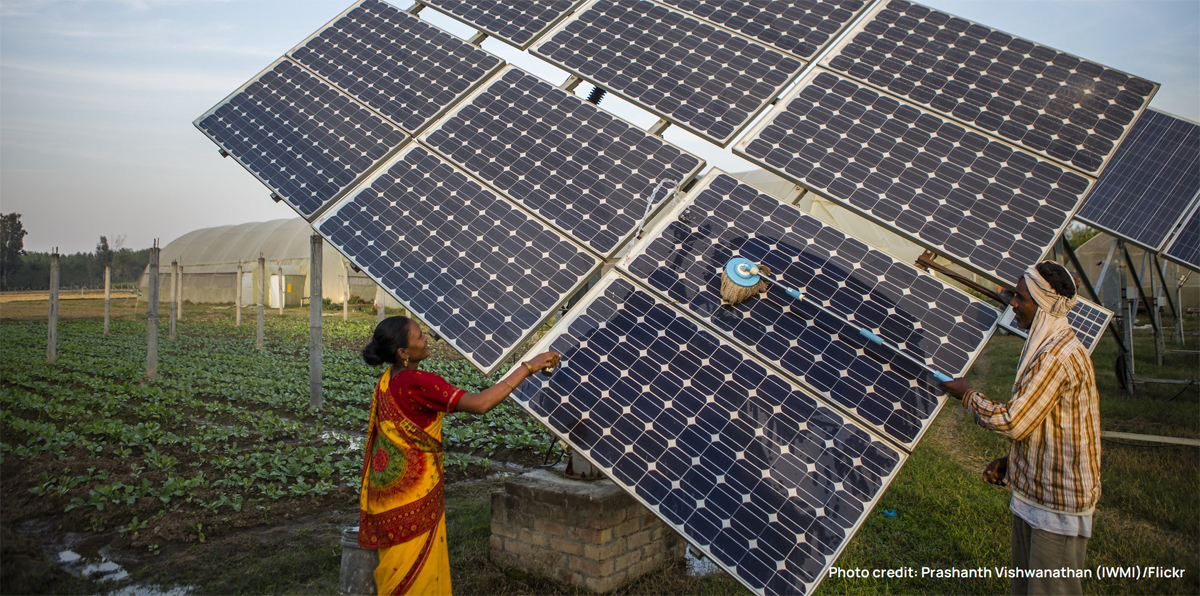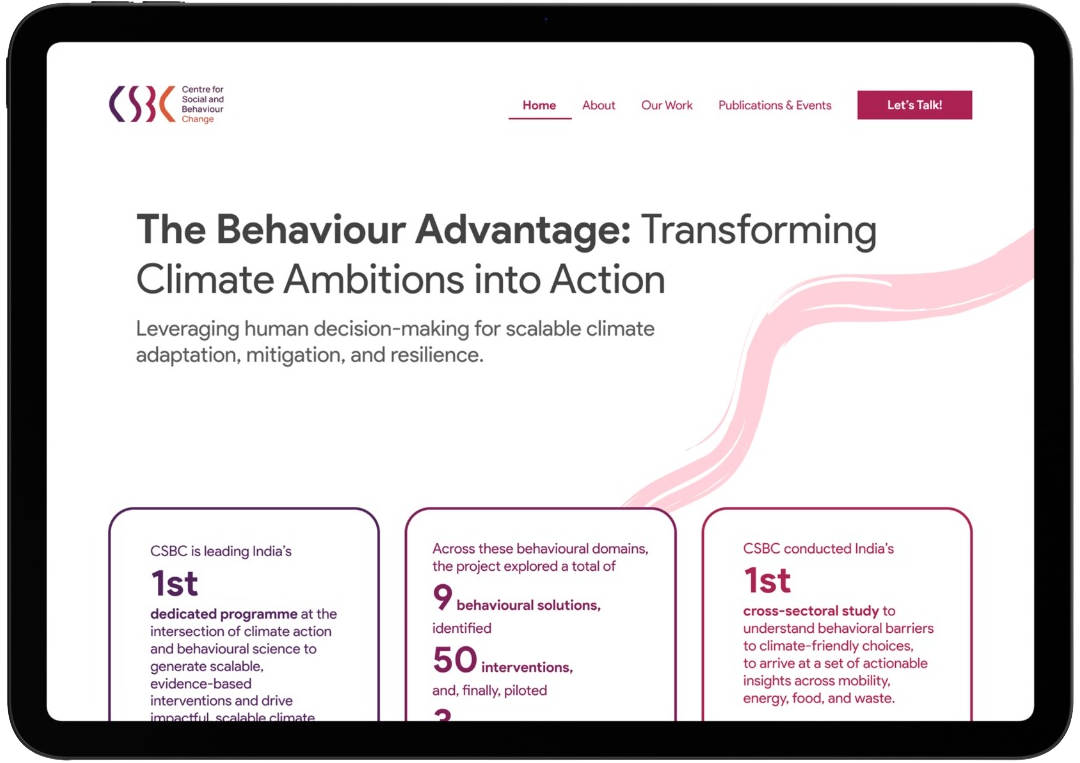- Year Present
- Theme Climate Change
- Team Sustainability
Partnerships
- MacArthur Foundation



Explore our comprehensive work at the intersection of climate and behavioural science. From our Low Carbon lifestyle programme to cross-sector projects, discover research findings, publications, events, and real-world applications that drive climate action through behavioural changes across mitigation, adaptation, and resilience.
Diagnostic Reports
The Low Carbon Lifestyles Programme is dedicated to fostering the adoption of low-carbon technologies and sustainable lifestyles in urban India.
Addressing climate change is a pivotal challenge for our generation. As the world's third-largest emitter of greenhouse gases (GHGs), India's efforts to pioneer low-carbon development while managing poverty will significantly affect global sustainability.
Medium and high-income households disproportionately contribute to GHG emissions due to their lifestyle choices. As the middle and upper classes in India continue to grow, their electricity and fuel consumption is expected to rise, further increasing emissions. Despite the availability of low-carbon technologies and lifestyle choices, adoption rates in India still need to improve. There is an opportunity to address this gap in climate action by understanding the choice architecture of decision-making by individuals, households, and communities and integrating promising low-carbon choices and behaviours into policies.
The Centre for Social and Behavioural Change (CSBC), Ashoka University, and the MacArthur Foundation launched the Low Carbon Lifestyles Programme to explore and promote low-carbon choices in urban mobility, household energy consumption, material use, and food consumption. The Programme aims to help India curb rising GHG emissions by encouraging low-carbon behaviours among individuals, households, and communities in urban areas, ensuring that consumer choices and local barriers inform policies and programs.
Reducing energy consumption is essential for climate action, especially in a warming country like India. Air conditioning contributes significantly to GHG emissions, often sub-optimally due to misinformation. This pilot, supported by Recyclink, aimed to reduce household energy consumption by promoting energy-efficient air conditioner usage. The study, conducted in five housing societies in Mira-Bhayandar, Maharashtra, over six months in 2023, involved behavioural nudges to encourage residents to set their AC temperatures to the optimal setting of 24°C, aiming to instil lasting energy-saving habits.
Despite challenges in deploying the study across 588 households in the apartment societies of Mira-Bhayandar, CSBC successfully addressed misconceptions about optimal air conditioner usage. An endline survey revealed that residents who received CSBC’s interventions were significantly more likely to set their air conditioners to the default temperature of 24°C.
Result highlights include:
The study identified barriers, such as misinformation about optimal temperature settings. It utilises behaviourally informed interventions to address these barriers. The intervention covered 588 households and demonstrated that simple visual cues can effectively nudge residents towards better practices. The interventions included:
1. Stickers on Remotes: CSBC designed vibrant stickers for air conditioner remotes. These stickers featured the recommended temperature of 24°C and a message highlighting the cost implications of setting temperatures lower than this, “For every degree cooler, there is a 6% higher bill.” This provided a real-time visual cue to users.
2. WhatsApp Campaign: A communication campaign was conducted through WhatsApp groups within apartment societies. Society heads distributed stickers and shared messages about the benefits of maintaining the 24°C setting. Regular updates and peer examples reinforced the behaviour, leveraging social proof and community engagement.
3. Community Engagement: The intervention included showcasing residents who adhered to the recommended temperature, creating a sense of recognition and motivation. Educational content was provided to emphasise financial and environmental benefits, fostering a culture of energy efficiency.
Household waste segregation is a critical step in effective solid waste management, yet ambiguous language around categories like 'dry' and 'wet' waste hampers segregation efforts. CSBC partnered with Recyclink in Mira-Bhayandar to address these behavioural barriers by simplifying the language used to reduce confusion and improve adherence to segregation norms.
The Programme was conducted over eight weeks in partnership and targeted 1,546 households. Stickers with simple visuals and messaging were distributed, and community leaders were involved in delivering positive reinforcement through WhatsApp groups. The study demonstrates the importance of clear, intuitive communication in promoting sustainable practices.
The intervention involved reframing waste categories to 'Kitchen & Garden Waste' and 'Other Waste' stickers to be put on dustbins, which acted as visual cues when throwing waste to simplify the process for households. Stickers displaying these categories were distributed to 1,546 households, and community leaders acted as messengers to distribute the materials and share messages focussed on simplifying the process of waste management in WhatsApp groups. The study used a baseline and end-line survey to measure the effectiveness of the interventions. The use of simple language, visual aids, and trusted messengers was intended to reduce cognitive load and increase the ease of waste segregation.
The Windlass River Valley initiative was launched in 2023, focusing on improving solid waste segregation through behavioural change interventions. Segregating household waste is critical to reducing landfill contributions and greenhouse gas emissions, but cognitive biases and ingrained habits prevent this practice from being widely adopted. In Dehradun's Windlass River Valley, only 10% of households segregate waste properly. Collaborating with Waste Warriors, CSBC designed an evidence-based strategy utilising visual cues, peer influence, and social proof to motivate residents to adopt sustainable waste practices. A group of "Active Citizens" from the community championed these practices, shifting household behaviour toward waste segregation. Within eight weeks, 70% of households were consistently segregating their waste.
The CSBC intervention focused on leveraging behavioural science to reduce the cognitive load around waste segregation. Interventions included:
The Windlass River Valley campaign demonstrated that behaviourally informed interventions can significantly improve household practices, even in areas where habits are deeply ingrained. Reducing cognitive load, introducing proximate goals, and leveraging peer influence proved critical in shifting behaviour. Furthermore, using existing communication channels such as WhatsApp makes the approach cost-effective and easy to replicate. Future studies could explore the long-term sustainability of these behaviour changes and potential adaptations for different socio-economic contexts.
This phase builds on the Low Carbon Lifestyles Programme (Phase 1) findings to support behaviorally-informed climate policies. It focuses on creating capacity among partners to apply behavioural science to climate action and establishing India's leading research and advocacy program on behavioural change and climate action. The objective is to develop a robust programmatic strategy integrating behavioural insights into climate policies and practices, promoting widespread adoption of low-carbon technologies and lifestyles.